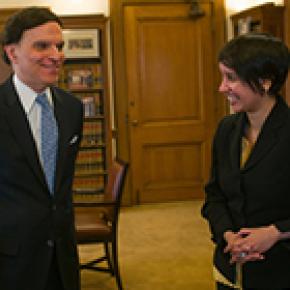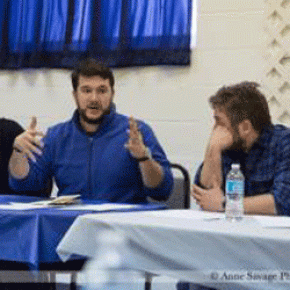A Call to Action From NMAC & Housing Works
People in the movement might be surprised by a joint letter from Charles King of Housing Works and me, but these are...
People in the movement might be surprised by a joint letter from Charles King of Housing Works and me, but these are not ordinary times. NMAC is writing this letter to invite constituents at this year’s United States Conference on AIDS to join Housing Works efforts on Wednesday, September 6, to greet Congress on its return from summer recess with a rally for the care we need to survive—sign up here!
These are confusing times with no clear roadmap. Since NMAC is hosting the HIV/STD Action Dayon the same day, we want everyone to be aware of our mutual support and collective goal to not just save the Affordable Care Act, but to also strengthen our vision of ending AIDS as an epidemic. This can only happen when affordable health care becomes a human right for everyone.
Read the full article here.
Seeking Better Legal Help for Immigrants
New York Times - January 28, 2013, by Kirk Semple - In the next several days, the deans of the nation’s top law schools...
New York Times - January 28, 2013, by Kirk Semple - In the next several days, the deans of the nation’s top law schools will be notified of a new job opportunity for their graduating students. Applicants must be high achievers who want to be part of a groundbreaking start-up, live in New York City, train with veteran lawyers and help create a new paradigm in immigration representation.
The call comes from the Immigrant Justice Corps, a new group that received a life-giving injection on Tuesday when the board of the Robin Hood Foundation, a poverty-fighting philanthropy, approved more than $1.3 million in funding.
The initiative is the long-nurtured idea of Robert A. Katzmann, the chief judge of the United States Court of Appeals for the Second Circuit, who has for years campaigned to redress a grave problem: the shortage of competent legal representation for immigrants, particularly those of modest means facing deportation.
The group’s plan is to recruit 25 graduating law students or recent graduates, immerse them in immigration law and then farm them out to community-based organizations. The young lawyers would commit to at least two years of service and as many as three.
“It’s a very simple concept, but it’s one that will not only ensure fairness for immigrants but will infuse our legal system with a generation of lawyers committed to serving those in need,” said Judge Katzmann, whose father was a refugee from Nazi Germany and whose maternal grandparents were immigrants from Russia.
The corps intends to hire a cadre of 25 lawyers every year, each earning a salary of $47,000 plus benefits. They will be assisted by recent college graduates with multilingual skills who will handle less complex cases, such as naturalization applications. The team will be supervised by a group of staff lawyers and advised by veteran lawyers.
Organizers estimate that by the third year, the corps will be handling nearly 15,000 cases a year, about double the number of immigration cases currently overseen by nonprofit organizations in New York City.
Robin Hood’s grants, while enough to get the initiative off the ground, will cover only a fraction of the project’s operating costs, which are expected to total about $4 million in the first year and about $7 million in each successive year.
But foundation officials and corps board members anticipate that they will be able to raise money from other foundations as well as philanthropists and the government.
During an interview this month, with the foundation’s approval nearly certain, Judge Katzmann turned emotional.
“The dream is about to come true, after lots of hopes and some disappointments,” he said, pausing for a moment. “I’m choked up as I’m thinking about it.”
In 2007, deeply concerned about the quality and availability of representation for immigrants, he sounded a clarion call and started a study group that investigated the issue’s impact on immigrant populations. Among its findings: Most detained immigrants in the New York region did not have counsel at the time their cases were completed.
Judge Katzmann and his allies have warned that, absent new programs, the problem would grow worse should Congress pass comprehensive immigration reform providing legal status for undocumented immigrants.
The study group spawned an initiative, the New York Immigrant Family Unity Project, which seeks to provide legal representation for every poor immigrant facing deportation in New York.
But Judge Katzmann pressed for more: a national army of young lawyers in the style of public service programs like AmeriCorps Vista or the Peace Corps.
Robin Hood heard about the idea last spring and agreed to fund a planning process. Organizers decided to limit the project to New York City, at least until it had sufficient funding to expand nationally.
Nisha Agarwal, the executive director of the Immigrant Justice Corps, views the pilot project as something that could be replicated in other cities with large immigrant populations, and as a kind of feeder system for legal talent. “Maybe these fellows will leave these fellowships and go elsewhere in the country,” she said, “and be leaders in immigrant representation.”
Source
Extraordinary organizing effort to assist undocumented immigrants impacted by the #FlintWaterCrisis needs YOUR help
Art Reyes III is Director of Training and Leadership Development at Center for Popular Democracy. He along with the...
Art Reyes III is Director of Training and Leadership Development at Center for Popular Democracy. He along with the Genesee County Hispanic Latino Collaborative and a powerful group of organizers from around the country are working in Flint to be sure undocumented immigrants in Flint are getting the help they need in the midst of the water crisis there. The need is real. Many undocumented people are not getting the information they need and still more are too afraid of being detained to go to water distribution sites. It’s a legitimate fear as the U.S. Department of Immigration and Customs Enforcement (ICE) is reported to detaining people in grocery stores and other areas around Flint:
Juani Olivares, says there are roughly a thousand undocumented immigrants in Flint – and many have spent years hiding from authorities to avoid deportation.
“Water was being delivered,” she says, “and they (immigrants) were not opening the door. Because that is the one rule. Do not open the door.”
Let’s face it, undocumented immigrants aren’t paranoid: The government really does want to get them.
Juani Oliveras works with the Genesee County Hispanic/Latino Collaborative. She says rumors are flying about sporadic raids at grocery stores.
“That’s another reason why people are not getting the water,” she says.
What’s worse is that many of these folks are still boiling water before drinking it because that’s what they have been told to do in the past when e. colicontaminated the city’s drinking water. In the case of lead contamination, however, it’s exactly the WRONG thing to do because it concentrates the lead even further.
This past Wednesday, Reyes and other organizers held a training for lead canvassers in Flint, setting the stage for what they hope will become regular daily canvasses until the water issue is resolved.
I spoke with Reyes after the organizing meeting to get a better understanding of what they are hoping to accomplish. He told me that there is currently no infrastructure in place to do what needs to be done in the undocumented community so they are literally building it as they go. He told me that there are an estimated 1,000 undocumented people in Flint. The goals of his group are fourfold:
First, they want to educate people about the water situation to ensure they know what precautions to take and what things to avoid (like boiling the water.)
Second, they want to make sure people are getting the water, water filters, and other necessary items that they need to stay healthy. The state has already been neglected this marginalized population and the poisoning of Flint’s drinking water is making things much, much worse.
Third, they are collecting stories from people. Unless the stories of those who are impacted are lifted up and heard, there will be nothing to stop this from happening again.
Fourth, they are trying to create a database of undocumented immigrants so that they can continue to work with them as needed until the crisis is over. This one is very difficult. The idea of getting into any database is, of course, the greatest fear of people here without documentation.
Finally, they are working to build a database of partners and volunteers who can help them with their effort.
How can you help? There are several ways. First, you can donate money. The Genesee County Hispanic Latino Collaborative has set up a fundraising page HERE.
Second, you can volunteer your time and resources to the effort. This will be an ongoing project and they will need assistance for the foreseeable future. Spanish-speaking volunteers are in particularly high demand. They also need things like storage and organizing spaces, trainers, printing, and all of the things that go along with a long-term effort like this. Click HERE to volunteer.
Third, you can donate water.
Finally, educate yourself about the issue. A good starting point is this essay by Art Reyes titled, “I Grew Up in Flint. Here’s Why Governor Snyder Must Resign. “.
One of the groups assisting with this effort is a small non-governmental agency (NGO) called Crossing Water. The group is headed up by social worker Michael Hood who has brought together around 150 social workers from around the country along with several hundred other volunteers and donors. They have already put up several billboards around Flint in both English and Spanish letting people know not to boil the water. They have plans for more billboards, including trailer mounted billboards that they can drive around Flint. They are also using donations to pay for public service announcements on television and radio. They’ve created videos on how to properly install and use water filters and teaching new parents not to use tap water to mix with baby formula. They have recruited plumbers to help replace lead-containing plumbing. This single group is making a huge difference.
Please do what you can to help with this important outreach effort. There are literally lives on the line, including the lives of babies and children.
Source: Eclecta Blog
IDNYC: Fuente de Dignidad para Miles
El Diario - January 30, 2015, by Ana Maria Archila - Se puede palpar la emoción este mes en las comunidades inmigrantes...
El Diario - January 30, 2015, by Ana Maria Archila - Se puede palpar la emoción este mes en las comunidades inmigrantes pues los neoyorquinos, incluidos miles de inmigrantes indocumentados deseosos de más acceso e igualdad, acudieron en masa a inscribirse para IDNYC. El éxito del programa es claro, ya que más de 12,000 residentes ya se han inscrito y más de 100,000 otros tienen cita para hacerlo.
Los beneficios de tener tal identificación son básicos, pero la tarjeta de identificación gubernamental es absolutamente necesaria para quienes de lo contrario enfrentarían muchos desafíos en el diario vivir.
Guadalupe Paleta, madre indocumentada y residente de Queens, hizo cita la semana pasada. Con identificación, podrá visitar la escuela de sus hijos sin necesidad de preocuparse. No le molesta tener que esperar unas cuantas semanas para solicitarla. "Esta identificación indica que estamos acá, que nos ven", dijo.
Para las familias inmigrantes como la de Guadalupe, el programa de identificación ofrece mucho más que una tarjeta con foto. Nos dice que, independientemente de nuestra situación, si hemos echado raíces aquí, pertenecemos aquí.
El entusiasmo por IDNYC es enorme. Ante la oportunidad de tener una tarjeta que simboliza su estatus como neoyorquinos, los inmigrantes acudieron en masa. Nuestras familias atestaron oficinas e hicieron largas filas. Fue prueba de la labor hecha por la oficina del alcalde, como también la comunidad –organizaciones de servicio y de activismo, medios de prensa y otros– para informar a los neoyorquinos sobre el programa.
Pero no todos nuestros vecinos tuvieron la sensatez necesaria para darse cuenta del valor histórico y cívico de lo sucedido. Opositores al programa no pudieron resistir la tentación de armar escándalo.
Hicieron que otros en el entorno de comentarios noticiosos cayeran en la trampa de perder la perspectiva y fueran tendenciosos en su opinión sobre el programa.
La indignación y las protestas sobre las fallas del programa provinieron de quienes nunca apoyaron IDNYC, y a muchos nos parecieron poco sinceras. Simplemente no se percataron de la verdadera noticia que se producía ante sus ojos: la ciudad de NY sirve de inspiración al incluir cada vez más a todo tipo de personas.
Sin embargo, este programa es demasiado importante para demasiados neoyorquinos como para convertirse en una serie de golpes editoriales bajos al alcalde.
A todos nos deben alentar y conmover las imágenes de familias inmigrantes que se inscriben para IDNYC. Confirman la importancia de una política municipal dinámica que facilita la inclusión de los inmigrantes.
Para ver el articulo original, haga un clic aqui.
Chicago Activists, Lawmakers Deliver Petitions To SEC For Action On 'Toxic' Interest Rate Swaps (VIDEO)

Chicago Activists, Lawmakers Deliver Petitions To SEC For Action On 'Toxic' Interest Rate Swaps (VIDEO)
Chicago community activists and local elected officials delivered 88,000 petition signatures to the U.S. Securities and...
Chicago community activists and local elected officials delivered 88,000 petition signatures to the U.S. Securities and Exchange Commission's (SEC) regional office Thursday morning, urging the agency to investigate complex financial agreements called interest rate swaps.
Those who delivered the petition signatures, collected online by the Grassroots Collaborative and several other organizations, say cash-strapped local and state governments are being squeezed by the "toxic swaps" they entered into with banks before the Great Recession. The complicated deals, which come with hefty penalties and termination fees, were intended to save taxpayer-backed organizations money, but they backfired when the economy crashed.
"These are the same toxic swaps that have drained millions of dollars out of our city, state and (Chicago Public Schools) budgets and are hurting cities and states across the country," Saqib Bhatti, director of the ReFund America Project, said outside the SEC's Chicago regional office, 175 W. Jackson Boulevard.
Illinois State Reps. Robert Martwick (D-Chicago), Emanuel "Chris" Welch (D-Westchester) and Chicago Ald. Carlos Ramirez-Rosa (35th Ward) joined activists at the petition delivery.
Petitioners want the SEC to "investigate the 'toxic swaps' Wall Street is using to impoverish our cities and towns -- and make bankers return all ill-gotten profits from deceptive and fraudulent sales."
The state of Illinois has already paid $684 million for interest rate swaps and could be forced to pay an additional $870 million in November if "the state does not sue or renegotiate these deals," according to the Grassroots Collaborative.
Interest rate swaps, Ramirez-Rosa said, have cost the city of Chicago and CPS over $1 billion in combined payments, plus $600 million in costs associated with terminating the agreements.
"That $600 million in ransom to the banks went to go pad their bottom line," Ramirez-Rosa said. "The banks don't need more money. Our neighborhoods desperately need these funds. ... The SEC can act now to recuperate some of that money for the city of Chicago and the Chicago Public Schools, and they can act now to defend the state of Illinois from further payments, from paying a larger ransom, to these banks."
Welch said he is "disgusted" that "big banks continue to profit at the expense of our most vulnerable." He urged Illinois Gov. Bruce Rauner, Chicago Mayor Rahm Emanuel and CPS CEO Forrest Claypool to join the push for an SEC investigation into swap agreements.
"We ask the governor and our leaders in this city to stop putting banks before books," Welch said.
Here's more from the lawmakers at the petition delivery:
Organizers and the elected officials dropped off the petition signatures at the SEC's Chicago office, where a receptionist said she would give the documents to the regional director.
In addition to the Grassroots Collaborative, the online petition was circulated nationwide by Americans for Financial Reform, the Center for Popular Democracy, CREDO Action and Rootstrikers.
Read Progress Illinois' past reporting on how interest rate swaps work and their financial impact on the state, city of Chicago and CPS.
by ELLYN FORTINO
Source
The #MeToo Movement and Everyday Industries, Part 2

The #MeToo Movement and Everyday Industries, Part 2
The Center for Popular Democracy reports that 18 percent of women have upper-management positions, even though they...
The Center for Popular Democracy reports that 18 percent of women have upper-management positions, even though they make up 60 percent of first-line supervisors. People of color, namely black and Latino, are also delegated to low-level, low-paying positions, such as cashiering. Older, experienced employees often do not receive benefits or long-term rewards, according to The Washington Post.
Read the full article here.
Protesters On Hunger Strike For 17 Days Ask Education Department To Help
Two Chicago protesters who have been fasting for 17 days over the future of a local high school traveled to Washington...
Two Chicago protesters who have been fasting for 17 days over the future of a local high school traveled to Washington D.C. this week to take their fight to the national stage.
The protesters, joined by civil rights leaders and the presidents of the nation's two largest teachers unions, held a press conference on Wednesday and delivered a letter to Secretary of Education Arne Duncan, asking him to take action so city officials will make a decision about Chicago's Dyett High School, which closed in June due to low enrollment rates and test scores.
Twelve protesters have been participating in a hunger strike since Aug. 17 in an attempt to convince the Chicago Board of Education to reopen the school as an open-enrollment public school with a focus on science, which they say will best serve the needs of the community. The board is weighing various plans to reopen the school, but protesters say this process has been slow and inconsistent, and worry that the board will ultimately allow the school to remain closed.
Since the start of the hunger strike, four protesters have had to receive medical attention, according to the Chicago Sun-Times. Last week, a group of medical professionals asked Chicago Mayor Rahm Emanuel to intervene, calling the situation "a health emergency."
Only two of the protesters made the trip to Washington. The letter they delivered to Duncan on Wednesday asks him to "act swiftly to avert the further harm." An excerpt from the letter states:
"One of the challenges facing African American parents and students in Chicago is the lack of response and accountability from elected and appointed officials. Affluent neighborhoods receive selective enrollment and well-resourced schools. However, communities comprised of predominantly low-income and working families have to contend with under-resourced schools and privatization models that undermine the integrity of the community. We compel you to act on behalf of the residents of Bronzeville who have been rendered voiceless in this process."
At Wednesday's press conference, protesters Jitu Brown and April Stogner were joined by American Federation of Teachers President Randi Weingarten, National Education Association President Lily Eskelsen García, Advancement Project Co-Director Judith Browne Dianis, Schott Foundation President John Jackson, Coalition for Community Schools Director Martin Blank, and members of the Alliance for Educational Justice and the Center for Popular Democracy.
"Sometimes you have to put your own health on the line to get the attention of the world," said García.
The protesters want the Board of Education to choose their proposal for the school's future, which would reopen the school as the Dyett Global Leadership and Green Technology High School.
"We’re going to do whatever is necessary to keep this school and have an open enrollment school in our community,” said Stogner, a protester who has three grandchildren. “I’m hungry. But I’m not really hungry for food -- I’m hungry for justice. I’m hungry for justice for my grandbabies, for all the kids in my community."
“We live in a city where we are not valued as black and brown people,” she added.
Earlier this week, protesters met with Emanuel and officials from Chicago Public Schools to discuss the strike, but the meeting did not lead to any resolution.
"The mayor appreciates there are strong feelings about Dyett, and he understands there is a desire for a quick resolution about its future, however what's most important is the right decision," said a statement from the mayor's office. "CPS is engaged in a thorough review of Dyett, and while they are closer to a decision, they continue to weigh all the factors at play in an effort to achieve the best outcome possible -- one that will ensure a strong Bronzeville and a strong future for our children."
A spokesperson for Duncan said Department of Education leaders plan to meet with the protesters to hear their concerns.
“We respect the efforts of this group and worked to accommodate their plans to hold a press conference outside our building," said Department of Education press secretary Dorie Nolt in a statement. "Senior leaders at the Department will meet with representatives of the group today to hear more about their concerns. While this is squarely a local issue, we always welcome the opportunity to engage with concerned students, parents, educators and community members.”
Source: Huffington Post
EXCLUSIVE: City Offices Fail to Meet Law Requiring Them to Help New Yorkers Register to Vote
New York Daily News - October 21, 2014, by Erin Durkin - City agencies are failing to do their part to make voter...
New York Daily News - October 21, 2014, by Erin Durkin - City agencies are failing to do their part to make voter registration easier — even though they’re required to by law.
Legislation passed in 2000 mandates that 18 agencies give voter registration forms to visitors. But the Center for Popular Democracy found that 84% of those visitors were never offered a chance to register, according to a report to be released Tuesday.
In fact, 60% of the agencies didn’t even have forms in the office. And 95% of the clients were never asked if they wanted to register to vote.
“This is an urgent problem which is leading to the disenfranchisement of many thousands of low-income New Yorkers,” said Andrew Friedman, the group’s co-executive director.
The group found that 30% of people who visited the city offices weren’t registered to vote, higher than the national average.
Mayor de Blasio’s spokesman Phil Walzak said Hizzoner has ordered agencies to step up their compliance with the law.
Advocates say having city agencies help out with voter registration is especially important because most people nationwide sign up to vote at motor vehicle departments, but many city residents don’t drive.
Source
Warren calls for diversity in Federal Reserve leadership
WASHINGTON – The latest crusade in the name of diversity commenced on Thursday, this time aimed squarely at the makeup...
WASHINGTON – The latest crusade in the name of diversity commenced on Thursday, this time aimed squarely at the makeup of the Federal Reserve’s leadership and spearheaded in part by Elizabeth Warren, the senior U.S. senator from Massachusetts.
The Cambridge Democrat recently linked up with fellow Democrat, Michigan U.S. Rep. John Conyers, to send a letter to Janet Yellen, chair of the Federal Reserve Board of Governors, asking the former Clinton administration adviser to take action. They cited a 1977 law that requires the bank regulator to reflect the nation’s diversity.
The progressive duo began their missive by praising her work under President Barack Obama before stating that they “remain deeply concerned that the Federal Reserve has not yet fulfilled its statutory and moral obligation to ensure that its leadership reflects the composition of our diverse nation.” Instead, they said, the central bank’s leadership “remains overwhelmingly and disproportionately white and male,” and is drawn mainly from major banks and corporations.
The letter cites a statistic reported in February by the left-leaning Center for Popular Democracy that indicates that “83 percent of Federal Reserve head office board members are white” while “men occupy nearly three-fourths of all regional bank directorships.”
The lawmakers assert that the discussions among Fed leaders regarding labor market conditions never once mentioned the situation confronting blacks in 2010, the most recent year for which full transcripts are available. The lawmakers point out that the unemployment rate for blacks that year never fell below 15.5 percent, while the nation’s average jobless rate hovered just below 10 percent during most of that post-recession period.
Fellow Massachusetts U.S. Sen. Ed Markey put his signature on the letter, alongside those of more than 120 other Democrats in Congress
Warren and Conyers later took to social media to rally the public around the cause:
Former Secretary of State Hillary Clinton, the frontrunner for the Democratic presidential nomination, was also quick to throw her support behind the call for diversity:
“The Fed needs to be more representative of America as a whole,” Jesse Ferguson, a Clinton campaign spokesman, told the Associated Press Thursday, adding that Clinton also opposes the fact that three private-sector bankers currently sit on each regional Fed bank board.
The Fed is actively working to further diversify its ranks, bank spokesman Dave Skidmore said in a statement provided to AP.
“Minority representation on Reserve Bank and Branch boards has increased from 16 percent in 2010 to 24 percent in 2016,” Skidmore told AP. “The proportion of women directors has risen from 23 percent to 30 percent over the same period. Currently, 46 percent of all directors are diverse in terms of race and/or gender (with a director who is both female and a minority counted only one time).”
“We are striving to continue that progress.”
By BY EVAN LIPS
Source












29 days ago
29 days ago